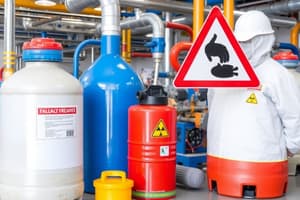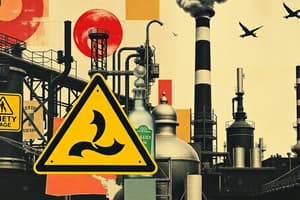Podcast
Questions and Answers
Which technique is commonly used for analyzing complex hazards to identify potential failures?
Which technique is commonly used for analyzing complex hazards to identify potential failures?
- Safety Sampling
- Job Safety Analysis
- Safety Surveys
- Fault Tree Analysis (correct)
What is a key component of the Permit to Work system?
What is a key component of the Permit to Work system?
- Safety Tag Systems (correct)
- Job Safety Analysis
- Loss Control Measures
- Accident Investigation
Which of the following techniques focuses on understanding hazards and their associated risks?
Which of the following techniques focuses on understanding hazards and their associated risks?
- Chemical Accidents Planning
- Safety Inventory System
- Accident Investigation Reporting
- Risk Assessment Techniques (correct)
What role does emergency preparedness play in disaster management?
What role does emergency preparedness play in disaster management?
Which of the following is NOT part of major accident hazard control techniques?
Which of the following is NOT part of major accident hazard control techniques?
Flashcards
Hazard Identification
Hazard Identification
The process of identifying potential hazards that could cause harm to people, property, or the environment.
Risk Assessment
Risk Assessment
Evaluating the likelihood of a hazard occurring and the severity of its potential consequences.
Major Accident Hazard
Major Accident Hazard
A hazard with the potential to cause significant harm to people, property, or the environment.
Emergency Preparedness
Emergency Preparedness
Signup and view all the flashcards
Disaster Management
Disaster Management
Signup and view all the flashcards
Study Notes
Plant and Equipment Safety Appraisal and Control
- Plant safety observation is a key technique for identifying and addressing safety concerns.
- Plant safety inspections are crucial for detecting potential hazards.
- Safety sampling helps determine the prevalence of safety issues.
- Safety surveys provide a broader view of plant safety practices.
- Job safety analysis ensures that individuals and tasks comply with safety guidelines.
- The safety inventory system tracks and monitors safety-related items.
- Product safety is essential for preventing harm associated with products.
- Permit-to-work systems regulate work in potentially hazardous areas.
- Safety tag systems aid in communication about safety protocols.
- Loss control aims at minimizing losses resulting from incidents on the plant.
- Damage control and system safety management are crucial for ensuring safety during and after incidents.
Laws and Regulations
- The Manufacture, Storage, and Import of Hazardous Chemicals (Amendment) Rules of 2000 provide safety guidelines pertinent to hazardous chemicals.
- The Chemical Accidents (Emergency Preparedness, Planning, and Response) Rules of 1986 outline rules for handling chemical emergencies.
- Hazardous Waste (Management, Handling, and Trans-boundary Movement) Rules of 2008 provide regulations related to hazardous waste management.
Hazards and Risks
- Hazard identification techniques, including inductive, deductive, Failure Mode and Effects Analysis (FMEA), and Cause Mapping Analysis (CMA) are utilized to pinpoint potential dangers.
- Fault tree analysis helps to visualize and understand potential failures leading to accidents.
- Risk assessment techniques help determine the likelihood and severity of hazards.
- Accident investigation, reporting, and analysis ensure efficient responses to accidents and support performance measurement and control.
- Hazard analysis techniques are used for identifying and measuring risks.
Major Accident Hazard Control
- A thorough understanding of major accident hazards is crucial for prevention and control.
- Hazard evaluation identifies potential and significant threats.
- The types and consequences of major accidents along with their potential severity are considered.
- Local authorities, management, and the public all play a role in major accident hazard control and planning.
- On-site and off-site emergency plans, along with case studies, help with response readiness.
- Implementation of effective control procedures and systems is crucial.
Importance of Disaster Management
- Emergency preparedness at a local level is vital.
- Contingency plans, along with emergency planning methods, are essential for disaster management.
- International standards like ISO 14001, OHSAS 18001, and OSHA's Process Safety Management System are important for disaster management considerations.
Studying That Suits You
Use AI to generate personalized quizzes and flashcards to suit your learning preferences.




